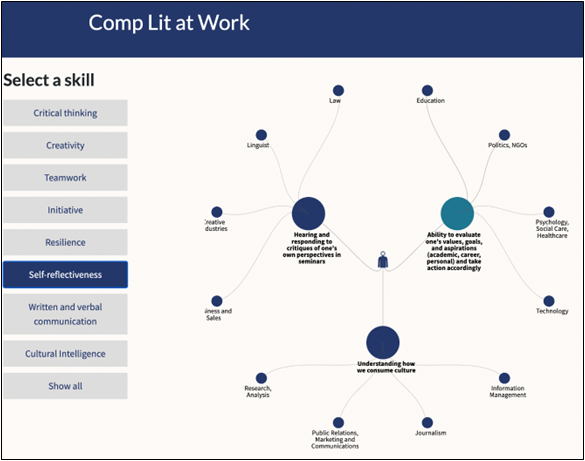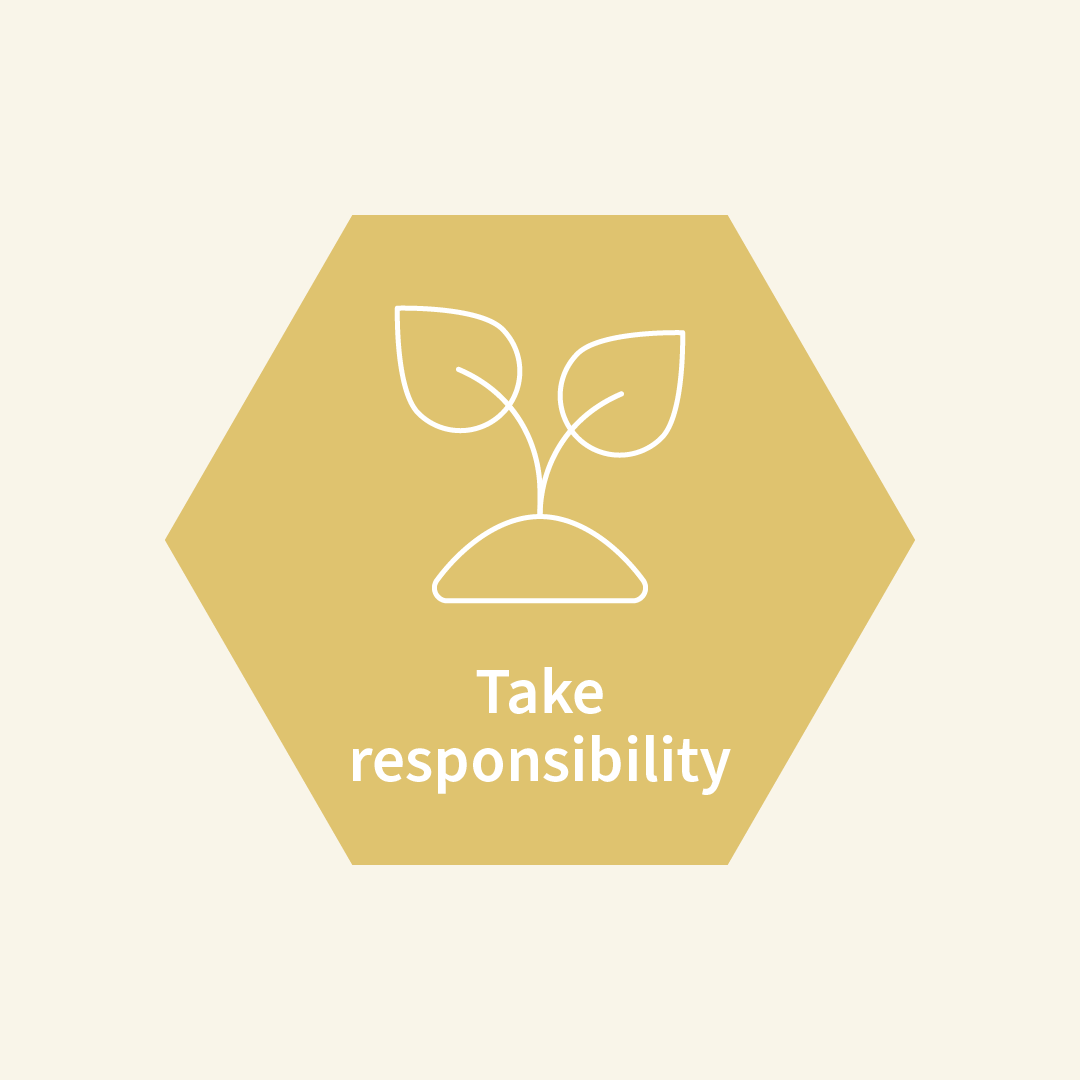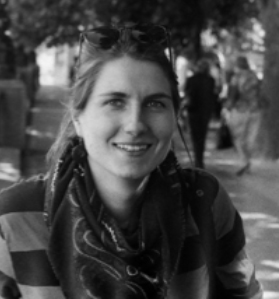Nurturing students’ confidence and employability through innovative skills mapping

A degree in Comparative Literature allows students to delve into a range of literatures and cultures from different time periods, genres, and languages, examining links between literature and other art forms such as music, film and visual arts. A major challenge for students is identifying and demonstrating to employers the various skills they bring and specific examples which are demonstrated through their degree.
Comp Lit at Work is one initiative which aims to help students with this. Comp Lit at Work is an interactive tool kit which helps students to:
- connect specific skills developed within their degree (e.g., cultural sensitivity, understanding and tolerance) to the skills required across a variety of careers
- explore a range of career options
- identify a range of skills to improve
- begin planning their career path.
 This platform, created by Dr Mika, QMUL Careers Service, Comp Lit students and TEKJA Data visualisation studio, combined students’ research, feedback and voice in order to map skills and knowledge specific to Comparative Literature students, connecting it to transferable skills and potential career pathways. Comp Lit at Work was a funded project from 2020 and has been in use and development since.
This platform, created by Dr Mika, QMUL Careers Service, Comp Lit students and TEKJA Data visualisation studio, combined students’ research, feedback and voice in order to map skills and knowledge specific to Comparative Literature students, connecting it to transferable skills and potential career pathways. Comp Lit at Work was a funded project from 2020 and has been in use and development since.
Identifying and articulating skills and attributes
Comparative Literature students develop a wide variety academic, personal, and transferable skills during their course. Some of these skills include the ability to draw connections between global political events, history, literature, and culture, seeing things from multiple perspectives, synthesizing complex articles and texts, and more. These skills are essential for a career in the the Civil Service or education, among others. The challenge is for students to be able to identify and confidently articulate their unique attributes and skills developed in the course of their Comparative Literature degree.
In response, the interactive, online employability skills map helps each student to identify, map, and recognize the range of skills they already have and those they might want to develop further, in relation to the career options they are considering.
Enhancing confidence and commercial awareness
 The initiative aims to enhance student experience by improving students’ levels of confidence, commercial awareness, their self-reflexivity, and the ability to translate their Queen Mary academic experience into future career pathways. This innovative tool, created for students by students, is embedded within the employability thread of the course teaching and is used within academic and career advising to allow students to reflect on their own skills and aspirations.
The initiative aims to enhance student experience by improving students’ levels of confidence, commercial awareness, their self-reflexivity, and the ability to translate their Queen Mary academic experience into future career pathways. This innovative tool, created for students by students, is embedded within the employability thread of the course teaching and is used within academic and career advising to allow students to reflect on their own skills and aspirations.
Responding to a need
The project directly builds on feedback from the NSS, CLC students, SLLC Reps, and the CLC’s curriculum revision, with input from students from across all year groups. The result was the embedding of employability across the core modules in Comparative Literature, through a series of tailored workshops and credit-bearing assignments, directly linked to the academic content of the modules: focusing on exploring one’s values and understandings of career (level 4); narrating one’s academic and professional trajectory in a CV and cover letter (level 5); oral presentation of one’s university journey (level 6).
Complementing and expanding that work, the online tool provides each student with a personalized and degree-specific way of translating the different components of one’s academic experience into the language of careers and personal development plans. This tool can also potentially allow the school to easily track which skills students may be lacking or demanding the most, and this can further help to implement new ideas into the curriculum.
The impact
We continue to use the CompLit at Work toolkit at all levels of our in-curriculum career provision. The module convenors leading the respective modules continue to embed career workshops into their module outline (co-led by the Queen Mary Careers and Enterprise team).
Although some students were at first surprised how early we talk about careers and taking ownership of one’s future, most (especially at level 4) appreciated this more personal development focus embedded in the course content. As one level 4 student wrote in their end of the year reflection (part of the final assessment): ‘The careers workshop was also significant. It was in this workshop that it was revealed to me the expansive path of career prospects comparative literature can lead to. Upon going to university, it was commonly asked of me by family and those around me if I wanted to be a writer or a publisher. Other suggestions never strayed far from careers with a literary focus. It alarmed me at first. I came to university with no set career in mind and had chosen a course in something I loved. Now I felt restricted and feared that I would be constrained to working with books in my life and would eventually grow tired of them, losing all interest in reading. The career workshop reassured me this wasn’t the case. The course I had chosen was fit with transferable skills that opened a range of paths I could venture down career wise.’
Next steps
Building on this clear learning curve, at level 4, we will slightly alter the self-reflection to include a 1-2-1 Careers appointment for all students. In terms of going forward, we want to make our collaboration with the Careers team even more robust, especially at levels 5 and 6. At level 6, where the careers assessment has a bigger overall weight and general pressure is higher, some students felt that careers components should not be graded. The module convenor also struggled, at first, to reconcile the academic and thematic focus of the module and the careers workshop, but despite these early challenges the module evaluations for that module were extremely positive.
Both the Comp Lit at Work toolkit and the careers workshops are now firmly embedded in our curriculum. Building on this, we want to make sure that the Careers and Enterprise provision (especially in Semester B for levels 5 and 6) is equally robust and complements, in ways specific to the Humanities, what we do in the seminars. This was identified as a key area for development, as some content and workshops felt too generic for our students and staff. To this end, in addition to working with the Careers team, we're also closely collaborating with the SLLF Careers Leads to offer a centralised robust career provision for all SLLF students.
A holistic approach
Comp Lit at Work is only one part of a holistic perspective into integrating employability into the course content. Employability is addressed within the course through various implementations such as tailored career events, designated career workshops for all core modules, and more. The course aims to use this closely integrated structure to ensure students when graduating are fully equipped to tackle the job market with both knowledge and the relevant attributes which make them a distinctive Queen Mary graduate.
Contributor profile
My name is Dr Kasia Mika. I joined Queen Mary's Department of Comparative Literature in September 2019 as a Lecturer in Comparative Literature. Prior to that, I was a Lecturer in Literary and Cultural Analysis at the University of Amsterdam and held a postdoc fellowship at KITLV (The Royal Netherlands Institute of Southeast Asian and Caribbean Studies) in Comparative Caribbean Studies. My research and teaching focus on topics that are socially and politically urgent with crisis, vulnerability, justice and futures being key to my pedagogy and my wider work in disaster studies, environmental humanities and postcolonial studies.
My teaching is all about working and reading together towards a better, more critical understanding of the world around us. All courses I teach are rooted in an inclusive dialogue and encourage everyone to participate and learn from each other. This tool, and my broader work on employability, is part of this effort to help students discover their strengths, nurture their intellectual life and find meaningful ways of being in the world.
